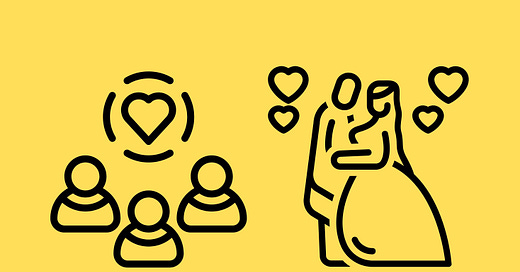Examining the Relationship Style Spectrum
Much has been written about polyamory, non-monogamy, and monogamy, and Carson’s essay can be added to the subset of such writing that’s excellent.
This isn’t going to be a long post because I’m going to suggest you read the essay to which I’m referring here. It’s excellent.
That essay is “Polyamory doesn't Liberate; Monogamy doesn't Protect” by Carson.
The essay is thought provoking. Most of it aligns with my own beliefs. Some perhaps not. But I like that it made me think deeply about the polyamory versus monogamy social discussion. It’s often good to have one’s perspective challenged a bit by other thoughtful minds.
Since I’m polyamorous and have eschewed monogamy my entire adult life, I quite clearly have a bias. Even before the polyamory label became known and widespread, my life functioned from a polyamorous mindset. Some of that is likely influenced by being embedded within gay men’s culture since my late teens and the prevalent non-monogamy acceptance that community has historically embraced. Even among gay men who prefer monogamy, there is generally an acceptance that many of their friends will be non-monogamous and there’s not much negative judgment about that.
But the leap from non-monogamy to polyamory is bigger than many think. For some, attaching feelings of intimate love to such relationships makes them balk. Which is fine. Different strokes for different folks. We need to abandon one-size-fits-all thinking about so much in our world, relationships included.
This passage from the essay stood out for me.
The past decade of writing and thinking about polyamory in the culture has been laced with endless ideological posturing. On the internet, you can find countless impassioned essays on whether polyamory is core to feminism, or if polyamory is a tool of the patriarchy, or whether polyamorous culture is more or less moral or equitable or humanitarian or evolved than monogamous culture. I usually don’t curse on substack…but fuck all that noise. Monogamous commitments and polyamorous agreements alike are ancient. They are probably both in our DNA. They each can be rewarding or disastrous. Whatever choices you make, please, for your sake, choose based on what feels right to you, and what you think will lead you to the good life. Do not run your romantic life based on what some blogger says is progressive, or some philosopher argues is moral.
I also believe it’s helpful to drop any identification around it. It’s quite possible that one sort of arrangement works better for you. But I have met so many cases of people strongly identified with one of either monogamy or polyamory that shifted their view when their situation changed, that I simply don’t believe anymore that one style is essential to anyone’s being. Relationship styles are practices not identities. One religion might resonate more with you for now, but you can always convert.
The advice to choose relationships and the form they take based on what feels right for you will never be bad advice. So often we default to preset structures and models. Those structures and models often aren’t a great fit and we need to adapt them to suit our needs.
Stopping the overuse of identity labels and especially being tightly attached to them is also good advice. Labels are useful. They allow us to discuss topics through a shorthand that avoids having to explain every little thing. But ultimately excessive reliance on labels probably does some harm too. I’ve said for years that words are only an approximation of what it is they represent. That applies to the labels we use for relationships too.
The entire essay and the topic generally are nicely summed up by this comment from my friend, Patrick Davis, when I posted the Carson essay on social media.
We must remember: All healthy and chosen relationship structures are intended to increase connection and joy. If that’s the result, the label is irrelevant.
Again, I recommend you read Carson’s essay. It’s worth your time.
You can use this link to access all my writings and social media and ways to support my work. My content is usually open and free to view, but for those who are able your paid subscription (click the Subscribe button) or patron support are always appreciated.




